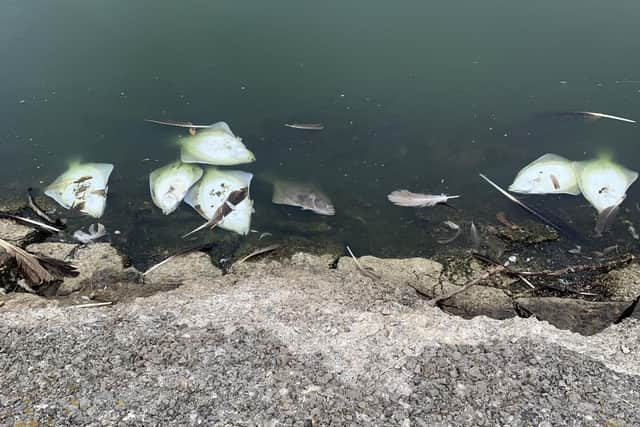‘Hundreds’ of dead fish wash up at Fairhaven Lake due to ‘low oxygen levels’
and live on Freeview channel 276
Residents first began noticing the dead fish washing up at Fairhaven Lake last week following a prolonged spell of warm weather.
Over 100 carcasses reportedly floated to the surface, with many residents describing the scene as “distressing”.
Advertisement
Hide AdAdvertisement
Hide AdFylde Council told the Gazette they were aware of the “unfortunate situation”, and said it was due to “low oxygen levels in the water”.


They added this was caused by “prolonged periods of hot weather”.
What is being done to prevent more deaths?
A spokesman for Fylde Council said: “We are doing our best to aerate the lake by moving the water with our boats and the fire brigade have also kindly pumped water in and out with their tanks.
“Fish are being removed and disposed of by our team and we have consulted with the environmental agency on this process.
Advertisement
Hide AdAdvertisement
Hide Ad“In the long term, our Heritage Lottery Fund project work on the lake itself includes aeration pods which should stop this issue from repeating.”
Why is warm weather dangerous for fish?
Warm weather can be highly dangerous for fish, particularly for more susceptible species like salmon and pike, according to the Environment Agency.
Hot and sunny weather typically triggers algal blooms, which can strip dissolved oxygen levels out of our waters, leading to fish becoming distressed and, in some cases, dying.
Signs that fish are in distress include appearing lethargic and/or unresponsive, sometimes close to the bank, tight shoaling and obvious gasping at the surface, and signs of infection or fungus.
Advertisement
Hide AdAdvertisement
Hide AdThe Environment Agency urged the public to help protect rivers and watercourses this summer by reporting sightings of fish in distress and algal blooms.
Dave Webb, an Environment Agency fisheries manager, said: “We are already working hard to mitigate the impacts of recent high temperatures and are monitoring the situation closely when it comes to protecting fish at risk.
“We aim to respond to reports of fish in distress as quickly as possible and will assist and advise landowners and fisheries who look after private lakes, ponds and watercourses.